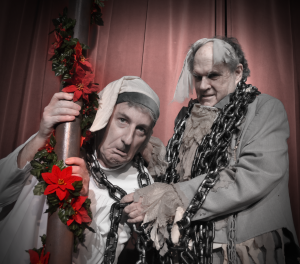The chancel area of St. Matthias Episcopal Church is not enclosed, so it is easily cleared of furniture to create a significant stage area when the sanctuary is used for concerts. The Chamber Music Concert Series at St. Matthias took advantage of this feature when it hosted a 28-member chamber orchestra and a 20-member chorus that included four vocal soloists for an ambitious program conducted by Stephen Klein. There were two works, a Bach cantata and a Haydn mass.
Composed for Ascension Sunday, J.S. Bach’s Cantata No. 11, “Lobet Gott in seinen Reichen,” was appropriately programmed on that day in the liturgical calendar. The cantata includes an opening chorus, recitatives for all four soloists, arias for soprano Andrea Blough and alto Amanda Gardner, and two chorales. While the chorus’s sound was continually pleasing, their German diction left a good deal to be desired. Many final consonants were either totally missing or delivered in an asynchronous manner. Perhaps it was that choral diction, perhaps it was a little sloppy orchestral work at the transition from the soprano aria to the final chorale, and perhaps it was a little catch in the throat of the tenor Don Davidson in his joint recitative with bass Kevin Doherty, but for whatever reason this performance, while acceptable and pleasing, seldom rose to the possible heights. The orchestra did its part well, with particular commendation going to the piccolo trumpets.
Both female arias were well performed, but the high point of the work undoubtedly was Ms. Blough’s aria “Jesu, deine Gnadenblicke.” A graduate of Bridgewater College (near Harrisonburg, Virginia) with a master’s degree from Westminster Choir College, Ms. Blough is a newcomer to the Asheville area who has already linked up with Asheville Lyric Opera where she will exercise her bel canto skills. But she is a formidable “double threat” singer whose oratorio skills were on display at this concert. Singing with excellent feeling for the text, she projected a big tone over a very busy woodwind accompaniment.
Stephen Klein, like many choral conductors who are also organists, tends to underutilize his left hand. But we all know that the major work of a conductor is done in rehearsal, and the chorus had been excellently prepared for the Franz Joseph Haydn “Mass in a Time of War” (also known as the “Drumroll Mass” due to its use of tympani). Here the text was Latin, and the diction was much better. The chorus attended carefully to Klein as he led them and the orchestra through the subtleties of a composition dating from Haydn’s decade in London (the 1790’s) when some of his most mature thoughts were musically expressed. There are places in this work where Haydn anticipates the transition from the classical era to romanticism. It makes the hearer realize the debt that Beethoven owed to his teacher Haydn, and in particular the debt that Beethoven’s Missa Solemnis owes to Haydn’s late masses.
The Kyrie and Gloria were resonant with a full sound. In the Gloria, Kevin Doherty’s solo passage “Qui tollis” was particularly effective, beginning with the accompanying solo cello of Ron Lambe and ending with a most expressive “Miserere nobis.” In the Credo, the chorus got its turn to shine with a moving transition of feeling from “crucifixus” to “passus” to “resurrexit.” The sorrow of crucifixion and the resignation of burial were followed with the ecstasy of resurrection.
The brief Sanctus is followed by a Benedictus during which the four soloists demonstrated clarity and a very good blend. A moving Agnus Dei completes the high mass. We can be thankful that Haydn had moved out of the sphere of influence of Emperor Joseph II (who forbade the performance of solemn masses with elaborate instrumental accompaniment), and we can be thankful again that Asheville’s musicians (some professional, some amateur) volunteer their efforts to perform works of importance such as this one, and to perform them so well.











